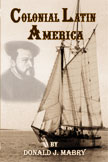European Background to the Discovery of America (revised)
BRIEF NOTES
© 2001 Donald J. Mabry
Spain and Portugal had national dynastic monarchies. This is
important. Nationalism meant escaping from the feudal system of personal allegiance
and widespread fragmentation. National dynastic monarchies had larger a organized unit as
a source of power and had more control. England was the first national state and Spain and
Portugal were early as well.
Spain had been conquered and occupied by Moslems and the Reconquest
gave a crusading spirit to Spanish Christianity and a strong military cast to the Spanish
upper class. Spain reconquered Granada but this event is not that important in explaining
how and why Spain conquered the New World. By the mid-13th century, nearly all of Spain
had been reconquered. Spain was not really a single kingdom but we use the term
"Spain" for convenience. The Iberian peninsula still had separate kingdoms with
lots of differences including language, provincial loyalties, and regional jealousies. The
fruition of the movement to create a Spanish national monarchy was coming to past at time
of discovery. Portugal was a dynastic state well before the conquest.
For expansion, these monarchies had to have:
- geographical position,
- economic resources,
- political organization,
- and the will to participate in a conquest.
The unification of Spain under Ferdinand and Isabela not as
systematic and easy as the creation of the Portuguese national monarchy for it took longer
but that fact was not the chief source of difficulty in "Spain" launching
voyages of exploration and conquest.
Both Spain and Portugal were closer to America, but it is not clear
how important geographical position was. Economies, in regards technologies, political
organization, and will were such that Europe was about to discover America. Portuguese
were working off Africa. Because of this, America was bound to be discovered, bound
to have someone blow across the Atlantic to America. Factors which made it possible
included technological change in sea-going vessels, the astrolabe, better maps, compasses,
sail patterns, and timber. One advantages of the Spanish and Portuguese in the 16th
century was that their most likely rivals were busy.
The dynastic system was a new thing. It was an improvement over
feudalism in that the centralization of power in signaled who was going to lead the
"nation." Made it clear that a particular people had the right to rule. System
worked. Succession is always the big problem in politics and the dynastic monarchy largely
solved that problem.
In the history of 16th century Spanish monarchy, Spain blessed by
good rulers, the Bourbons. Ferdinand and Isabel highly competent people. They ruled their
respective kingdoms independently, but cooperated for many purposes. Ferdinand tended to
do the foreign policy for both kingdoms. Charles I (1516-1556), their grandson,
effectively represented the merger of the two crowns. Was the fact that he was also
Charles V of the Holy Roman Empire help or hinder? Debatable. Charles was the
greatest monarch in Europe. He was a man of considerable ability, fine character, and
sense of responsibility. gave to all up into 1556 and went into monastery. Philip II
(1556-1598) has had a very bad press, some justified but a lot exaggerated. He was even
more governed by his religious beliefs that his father. Christians who didn't believe the
things that he did consider him a fanatic. He was a little pig-headed buy he was provided
stability. Had a tremendous sense of responsibility.
Some historians argue that he couldn't delegate responsibility. In
fact, there was a lot of delegation of authority because he couldn't do it all. He tried
to do more than was possible. The system was snowed under by paperwork bit he made his
situation worse by wasting time in reading too much of the correspondence instead of
having more of it read by others. When reading a letter from his ambassador to England,
who was stuck in London writing a report to the king while the other important people had
left the city, he made a notation on the margin of the letter. Next to where the
ambassador had described some insects buzzing around the window (talk about boredom!),
Phillip II had written "probably flies."
You can read about other topics in colonial Latin American history by buying and reading
 Colonial Latin America by Don Mabry.
Colonial Latin America by Don Mabry.
Click on the book cover or the title to go to Llumina Press.

